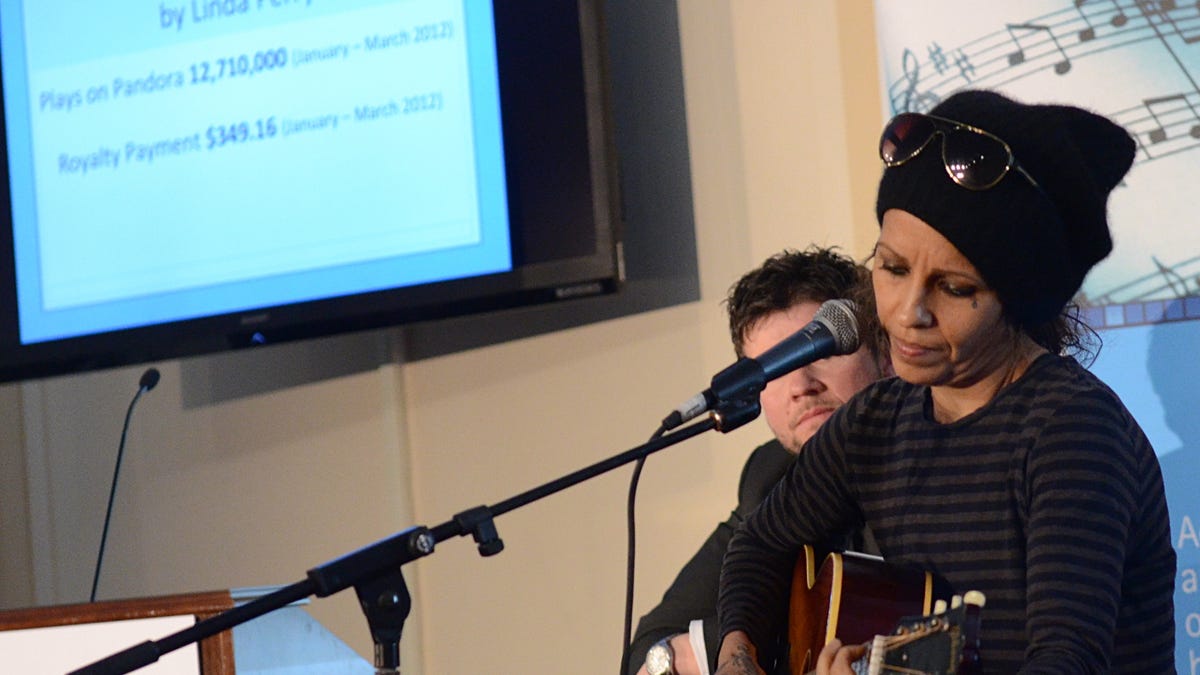Pandora's Web radio bill is doomed -- well, for now
If yesterday's hearing on Capitol Hill was any indication, Internet Radio Fairness doesn't have enough Congressional support.

WASHINGTON D.C.--The technology sector is supposed to be one of the new power players in national politics. But you might be wondering what happened to its newfound political capital after watching its hapless attempts to lobby Congress to pass the Internet Radio Fairness Act (IRFA), a bill that would reduce the music royalties paid by Web radio services.
At a hearing yesterday before a House subcommittee studying IRFA, the tech world seemed to be the same amateurs in navigating Washington as they were before January's triumph over the Stop Online Piracy Act (SOPA). Pandora and the other Webcasters say it is imperative for the continued growth of their burgeoning industry to cut the rates they're required to pay to access music. Lawmakers didn't seem to buy it. It was obvious that the IRFA doesn't have anywhere near the support it needs to pass.
This effort was less like SOPA and more like SOPA-thetic.
Last January, a group of tech companies stunned Washington by rallying massive opposition in Congress and the public to SOPA, an antipiracy bill supported by the music and film industries. After that, who would have guessed that Pandora and the other Webcasters supporting IRFA could fail to catch some of that political wind in their sails?
Yet fail they did. Pandora CEO Joseph Kennedy met with skepticism from many lawmakers on the subcommittee. Some of the congressmen suggested that the bill should have been called the "Unfairness Act" or the "Paycheck Reduction Act" for the way it seeks to reduce artist compensation. Meanwhile, Jimmy Jam, the music producer and artist who has worked with Michael Jackson, Prince, and George Michael, had a much easier time during his testimony. Among the committee members, there was plenty of support for music artists.
Rep Ted Deutch (D-Fla.) told Kennedy he was concerned that under the current rate Pandora pays, artists receive an average of $4 per listener. "That number under (the proposed) legislation would be reduced to 70 cents," Deutch said.
After the hearing, it was the folks from the music industry who appeared most encouraged. According to some of them, it was always going to be near impossible to pass a music bill during this lame-duck Congress. They're just too many other more pressing issues before lawmakers. Then there was the clueless way that Pandora tried to pitch the bill.
Tim Westergren, a Pandora cofounder, tried to position the IRFA as an attempt to serve artists. To the music industry, his argument boiled down to this: we need to slash the money we pay you in order to help you.
What's more, this fight just isn't SOPA. In that fight, the tech sector controlled the definitions of the debate, making SOPA less about piracy and more about free speech and an attempt to stifle it. True or not, the message resonated with the public. IRFA supporters failed to define their cause in the same consumer-friendly way. On the other side, the music industry appears to have learned from their crushing loss on SOPA.
In contrast to the major online and offline demonstrations against SOPA, this time the music sector marshaled greater resources for their side. Hours before yesterday's hearing, in the halls of the nation's Capitol building, government workers and IRFA opponents could be heard singing "Livin' On A Prayer." They were led by Desmond Child, one of the men who wrote the song made famous by rock band Bon Jovi, during a performance by song writers. The event was hosted by the National Music Publishers Association, which argues that the IRFA is anti artist.
As Linda Perry performed her song "Beautiful," which was a hit for Christina Aguilera, a slide was projected to the audience that showed between January and March this year, "Beautiful was played more than 12.7 million times on Pandora and Perry's compensation equaled $349.16." The music sector also generated support from outside its ranks. This week several conservative groups came out against the bill.
How that effort may have impacted the hearing is hard to say but this is how bad it got for IRFA during testimony. Some of the lawmakers seemed less interested in talking about the bill and began asking why Internet radio and satellite radio must pay but traditional radio does not. They questioned why Congress was looking at a little piece of the problem, Internet radio, when terrestrial radio broadcasters, a much larger group had been allowed for decades to generate profits from music without paying any compensation.
In one exchange, Deutch asked Pandora's Kennedy whether he couldn't do more to generate revenue from his business without cutting artist compensation. When he didn't get the answer he wanted he took an opportunity to take a shot at traditional broadcasters.
"Let me turn to [Bruce Reese, a radio executive who gave testimony on behalf of the National Association of Broadcasters]," Deutch said. "[Reese] has figured this out with the benefit of not having to pay the performers at all."
Earlier, Rep. Mel Watt (D-NC) said that the exemption for terrestrial radio is "about 90 percent of the problem."
What does all this mean? For starters, even if this bill is unlikely to make it out of this Congress, there's always next year. Rep. Bob Goodlatte (R-Va.), who oversaw yesterday's hearing is now chairman of the House Judiciary Committee. He said yesterday that he would welcome the chance to hold more hearings on this issue.
Still, I'm betting that all the parties, Web radio, traditional radio, and the music industry will sit down and cut a deal without government involvement. During the hearing, there were plenty of people, including Kennedy, who said they would favor a negotiated settlement.
Kennedy told lawmakers: "We would love to get Congress out of this business."

